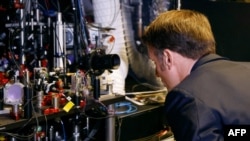The blockbuster movie “Oppenheimer” focuses on the work of American theoretical physicist J. Robert Oppenheimer in the development of the atomic bomb.
To prepare for the film, director Christopher Nolan reportedly did some heavy research into quantum physics, a study whose revolutionary benefits expanded into many fields after World War II, researchers say.
Quantum physics “is the study of matter and energy at the most fundamental level,” as described in an article on the California Institute of Technology’s website. “It aims to uncover the properties and behaviors of the very building blocks of nature.”
Different laws
“When you get down to the smallest particles and energy scales, the laws of physics seem to be different than the ones we are familiar with,” said Olivia Lanes, the global lead of education and advocacy on the quantum team at IBM.
“While we don't quite understand how this works, we have made incredible use of it,” she told VOA. Quantum mechanics has revolutionized technology in many ways, she said, from the solid-state hard drives in our phones and laptops to lasers and GPS.
"None of these would exist without the discoveries of quantum science,” she said. “These are all using the laws of quantum mechanics, so I think the next logical thing is to build a computer completely based on those laws.”
To do that, “we will take what we have learned about particles and matter over the last century and make an entirely new type of computational machine that harnesses these laws to open up a window of new possible calculations,” Lanes said.
“Nuclear physics, the scientific core of the film, is much more than what viewers will see on the screen,” Bryana Quintana, the communications lead for San Diego State University’s College of Sciences, wrote in a recent online article for the university’s News Center.
“Just as the internet and social media have had a vast impact on modern society, quantum science offers paths to improve our understanding of the universe and completely transform the way we do things,” she said.
Quintana cited several examples where quantum science is already at work in the scientific and medical spheres, from helping scientists harness nuclear reactions and making nuclear reactors safer and more efficient to improving medicine.
“Nuclear medicine involves techniques like using radioactive tracers to help provide more precise diagnoses and employing a radioactive form of iodine to help target and kill tumors,” she wrote in the article.
Quantum future
“Quantum computing is, at its core, a new framework and a new way to do computations and perform algorithms,” said IBM’s Lanes, who compares the science to classical computing.
“Classical computers run on bits, which are these little pieces of silicon that process information by translating everything into zeros and ones, and it runs on the laws governed by classical physics,” she told VOA. “But quantum computers run on quantum physics.”
Classical bits can only ever be in one of two energy states: 0 or 1. But the laws of quantum mechanics allow quantum bits, or qubits, to be in states that are a combination of the two simultaneously; a little bit of 1 and a little bit of 0 at the same time — at least until they are measured.
“This allows scientists to delve into whole new types of algorithms,” Lanes said, “ones that are specifically made to take advantage of this phenomenon. And some of these algorithms are exponentially faster than our best classical counterparts.”
In other words, algorithms made specifically for quantum computers that take advantage of this superposition phenomenon, as well as the ability to entangle qubits together, allow some problems to be solved exponentially faster and better than a classical computer.
“We see quantum computing as a complementary tool to classical computers," Charina Chou, director and chief operating officer of Google Quantum AI, told VOA.
“Qubits mirror the complexity of molecules in the real world, which makes them particularly well-suited to address relevant challenges - for example, the ability to design a better solar cell through understanding how electrons and photons (which follow the laws of quantum mechanics) are interacting in a material,” she said.
The tech giant has developed a quantum computer that can do calculations in a small fraction of the time it would take the most advanced computers.
Chou said this result was achieved using a benchmark algorithm (random circuit sampling) that they first applied in 2019 to demonstrate a quantum computer could significantly outperform a classical computer.
While quantum computing is at the experimental stage right now, it has the potential to revolutionize computing as we know it.
Google’s goal “is to build a large-scale error-corrected quantum computer capable of addressing problems that aren’t easy or possible to solve with classical computers, and make the benefits broadly accessible and useful,” Chou said.
Lanes said that in addition to medicine, future applications using quantum computing could include creating new materials that could help with climate change, or developing faster ships, boats and airplanes that can travel longer distances.
“We're hoping that it could benefit humanity by enabling us to discover all sorts of new materials and drugs and synthetic chemicals that can improve the way we live our lives,” she said.




